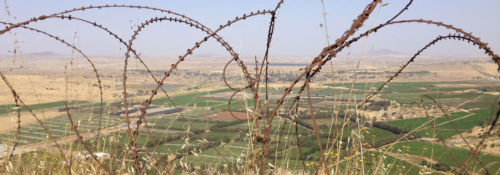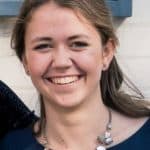
Heading East
Written by Ellen Sweet
The farthest east I’ve ever been is the Golan Heights, Israel. We stood on the hills, behind rolls of barbed wire, and looked out over Syria, with Lebanon to the north. We were so close to the border that I got a text message from Verizon: “Welcome to Lebanon. Intl data features are inactive. You may not be able to place calls.”
Two weeks before that moment on the Golan Heights, I stood the farthest east I’d ever been up to that point: somewhere in Athens. As far as I can tell from my travel itinerary, my journal entries, and Google Earth, the exact most-easterly spot was probably the Panathenaic Stadium, the site of the first modern Olympic Games.
It was a summer of adventure for me. After three years of studying the Western tradition, Hillsdale gave me the opportunity to go abroad, through a trip to Greece with the Collegiate Scholars Program, followed by a trip to Israel with ten other Hillsdale students through an organization called Passages. We climbed mountains, swam in the Aegean and the Dead Sea, and visited thousand-year-old churches and modern Parliament buildings. We saw the place where Agamemnon’s throne would have been before it crumbled off a cliff, and the steps that Jesus climbed every year to visit the temple. And we ate a lot of hummus.
Unfortunately for my extensive travel plans, I am currently broke, so the best way to continue my journey east would probably be to take one of Dr. Stewart’s famous Eastern history courses: History of the Middle East and History of the Far East. I asked him what students find most interesting in these courses: “A lot of students sign up for generic reasons: ‘I should know things about non-Western history,’ or ‘China’s kind of cool.’ I think they wind up being the most fascinated when we’re talking about topics and themes that they know pretty well from studying Western history, and then seeing different sorts of political arrangements that don’t match anything we have in the West. And then sometimes they’re just surprised by different things: like how there were actually Christian churches in China in the eleventh century, or that the Chinese sailed to California in the 1400s.”
Of course, Dr. Stewart isn’t the only professor who offers a window into a different culture. The history department also offers courses on the history of Russia, Africa, and Latin America. Dr. Jackson teaches a class on the Russian novelist Fyodor Dostoevsky, as well as a class called Reading Biblical Narrative, which treats the Old Testament as a piece of ancient Hebrew literature. Professor Westblade teaches Hebrew, and Dr. Garnjobst teaches Greek. Dr. Stephens offers courses on Eastern philosophy. And the language departments—French, German, and Spanish—although they participate in the Western tradition, certainly point east of Hillsdale, Michigan.
What makes foreign cultures so fascinating to us? As Dr. Stewart told me, “These classes give us a very different way of looking at things that helps us understand even our own tradition a lot better. You start to understand that it doesn’t have to turn out this way; there are other very distinct models out there. Trying to understand other people who have very different ways of understanding religion, politics, or economics gives you a much deeper insight into what we’re doing.”
We love our Western tradition here at Hillsdale, and for good reason. But to head East means discovering stories we’ve never heard, or discovering the roots of ones we think we know. To head East, whether on an airplane or in a classroom, means expanding our world to include that much more of humanity, stretching both our imaginations and our hearts.
 Ellen Sweet, ’17, is an English major and French minor from the beautiful state of Oregon, where the grass is always green. She is the President of the Hillsdale College Women’s Soccer Club, a member of both the Honors Program and Kappa Kappa Gamma Sorority, and a firm believer in the power of a good book.
Ellen Sweet, ’17, is an English major and French minor from the beautiful state of Oregon, where the grass is always green. She is the President of the Hillsdale College Women’s Soccer Club, a member of both the Honors Program and Kappa Kappa Gamma Sorority, and a firm believer in the power of a good book.
Published in November 2018